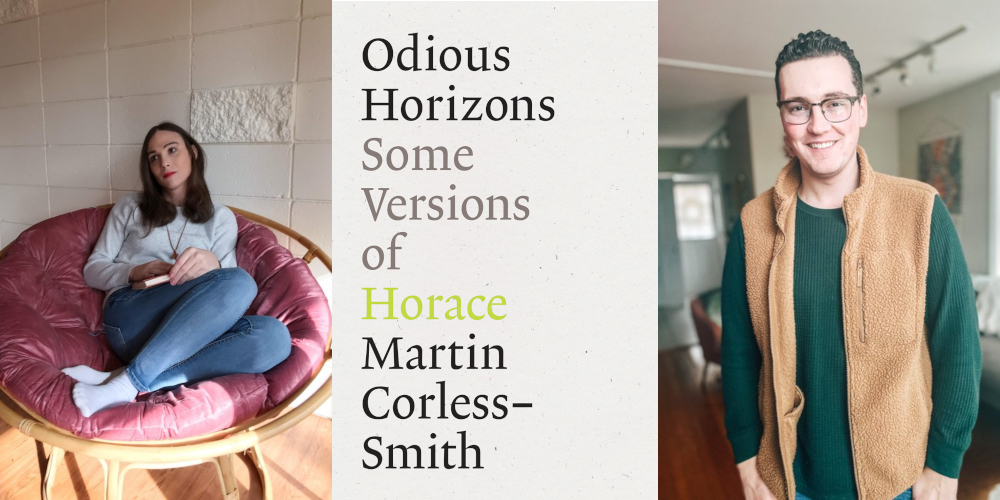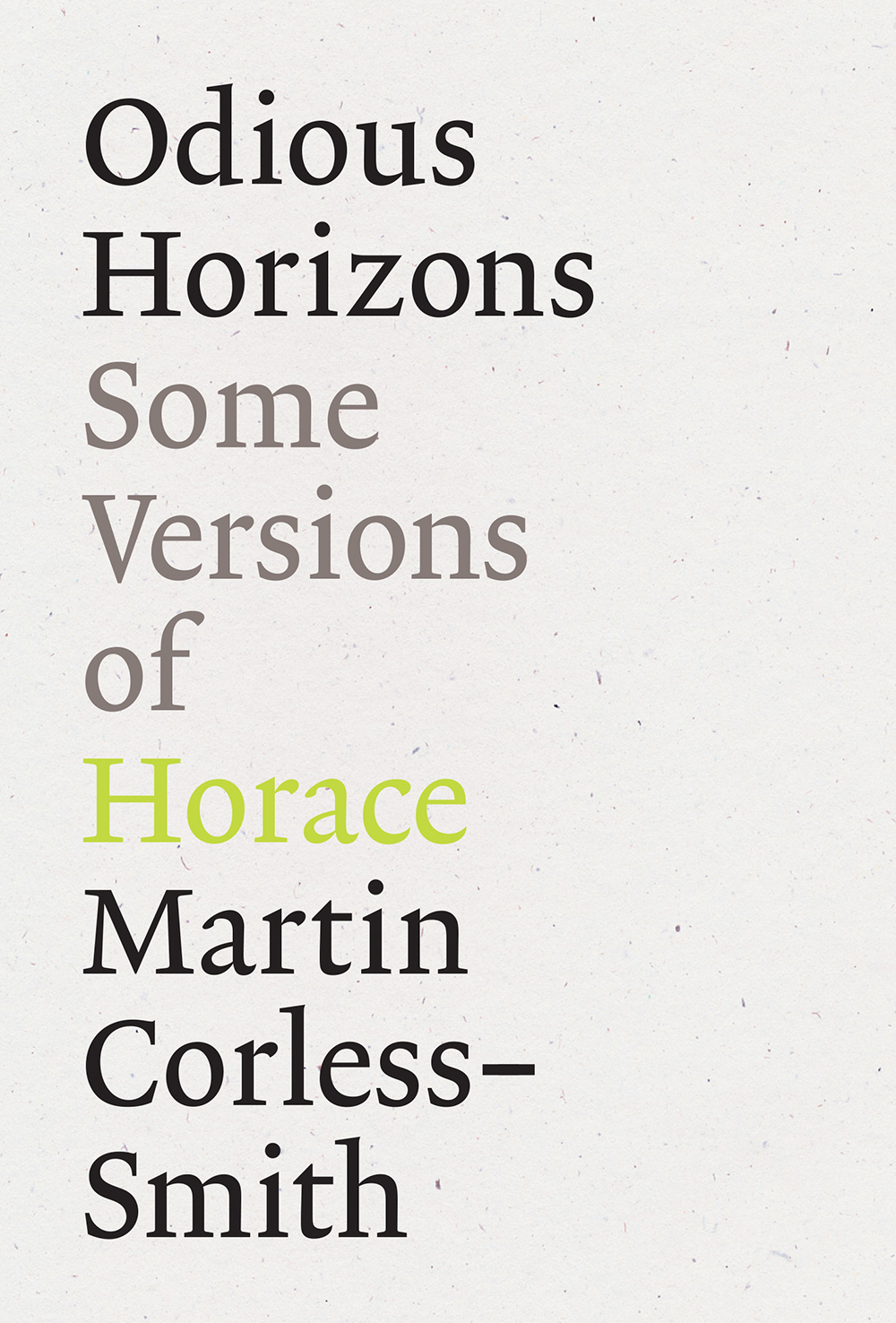Ventriloquist’s Transposition: A Conversation Concerning Martin Corless-Smith’s Odious Horizons

TS: What I think we’re reading in this book is a poetics of friendship as it can be fractured—and, thereafter, obliquely reassembled—by and in time. Martin Corless-Smith makes really clear in his beautiful preface to these poems that this book is not so much about “understanding” Horace (his are “versions”, after all, rather than “translations”) as it is about what it means to be with a poetic corpus for an extended period of one’s life, and how that corpus can change the poet-reader in some indelible way that feels impossible to accurately describe—though the impulse is ever there to try. This process is instructive, too, in many different directions: there was one quote from the preface about the connection to teaching in particular that I immediately wrote down in a little memo of quotes I keep on my phone. It says, “[a]s a teacher and a writer of poetry I never really feel that I am offering a definitive version of anything. I am more compelled to think of my task as offering an example of someone who has loved, and wants to share that enthusiasm.” I love this two-sided impulse to learn from the poems one loves and to share them with others so that they, too, can have their own version of that experience, what he calls “the true pleasure of poetry [...] the quiet intimacy of reading.” It feels expressive, free, and generative—it feels like the way poets should treat one another. Does this make sense?
DR: It makes sense, though I may be hesitant to employ words such as “should” in a proscriptive way like this. But I believe you poke into something very important, which is this view of the poet as situated at a nexus of past and future. As the poet’s role is, in the simplest construction, to communicate, I think this places “the poet” into a very interesting position which includes a kind of responsibility toward the literary community.
TS: This is a great insight. There’s a lot of interesting stuff going on in the tension I think you’re describing, between a hesitancy on the part of the poet-as-literary-citizen to be overly normative (Ariana Reines has a great line about this, presented in her poem as (what else!) an attributed quotation: “a poet wants to be right but does not want to win”) and the real and unignorable feeling you mention, of responsibility—also, of standing on the cusp of a unique lyric eternity.
To me what’s funny about this is how Corless-Smith enacts the very literary citizenship we’re discussing (by bringing the poems of Horace, in these versions, to a wider audience than they might otherwise reach) through versioning poems that play with, and even subvert, some of the ways that other poetries have tried to forge a sense of community or launch themselves into immortality—for example, in the poem “1.6” below that I’ve quoted in full:
Is it ok
Other poets
Sing of epic deeds:
Full armor, Fell anger, Fatal wars
I’m quiet on Ulysses
No Hector
My muse is love or levity
Not Mars
I’ll write about yr lunch
And pretty girls with painted nails—
Lazy & capricious foes—chasing after boys
Amused by lovers’ woes.
“I’ll write about yr lunch” undercuts with an O’Hara-esque simplicity and directness. This voice seems to be one where the only way for the lyric speaker to come into infinity is through love.
DR: There is a sense of compounding mirrors. Horace and his declaration to write the mundane reflecting in a long line until we get to Corless-Smith smiling at the end. And I absolutely believe he would be smiling. The project is all-consuming. As with all translation we are given an adaptation influenced by the mind of an intermediary. What a delicious space to concern oneself with literary citizenship within!
I am struck by not only Horace’s mastery of a kind of lyric conversation, but by the rendition of such into an adapted, casual register through the use of contemporary language. There is little effort made to preserve the work’s Roman context in favor of a reconstructed 21st century poetic archeology. This kind of historical tension makes the lines read like something one could pluck out of any number of contemporary journals. Mirrors but each one a little different. When applied to the concept of literary citizenship Corless-Smith is managing multiple poetic traditions while using his own body to stitch them together into a continuous quilt.
TS: The body-as-quilt feels like such a visceral (and feminist!) image—I’ve written some lately about the subversive potential of unexpected connections in poems, and the beautiful bifurcation of this particular poem (one of the few in the book with an explicit addressee, as it’s subtitled “FOR LAMIA”) across the suture of the stanza break nails it better than I ever have:
Blow sadness and fear
Over the oceans
To the frozen borders
Of our enemies
Weave fresh water
Weave fresh blossom
For my love
Forever here
I especially like the dismissive way that “frozen borders” are treated here—this is a poetics that relishes connection and “fresh blossom”, that enacts a radical immanence by bringing seemingly distant things (lovers, traditions, poetries) together in the “Forever here”, that ur-space of creation. It’s not interested in forcing things into predefined spaces of stasis, and it seems to like verbs (“Blow” and “Weave”) more than it likes nouns (“sadness”, “fear”, “borders”, “enemies”). Maybe it’s worth mentioning here too that some of these poems are really funny!
DR: I am continually surprised by Corless-Smith’s layers of translation. It is worth noting that his treatment of the Latin, itself, is marked by heavy excision. But not just an exclusion of source material, but a careful pruning and transposition skipping over two millennia like a volleyball. Anything that belongs to Horace’s period is removed. In Corless-Smith’s version of Ode 1.26 the invocation to the muses is absent, the “frozen borders” have lost their direct allusion to contemporary political conditions, reference to other characters are stripped away. In fact, character is what is pruned, here. To speak of an “un-space” of creation, what kind of fascinating abscesses are created within language by this process? What remains is all those verbs. The stuff doing, being something on its own. Two millenia later. The nouns were all left behind in the 1st century bce.
Which is what allows the poems to be funny. I am quite enamored by Corless-Smith’s take on 1.27, which finds a way to include the line, “Relax and sit yr ass down” for which I am thankful. It should not be overlooked that this sharp humor is one of Horace’s signature qualities, and Corless-Smith’s contemporary execution is worthy of that reputation. The very next ode, 1.28.1, demonstrates this wonderfully as the Greek scientist Archytas is replaced in the translation by Stephen Hawking, which goes on to transpose numerous other contemporary figures into the verse in place of their Ancient counterparts.
TS: I like that word, transposition—a moving of the work from one spatiotemporal location to another. Your careful reading here (“those verbs”!) makes me think of poetry as a kind of slope field, a set of processes capable of subsuming whatever particulars (of language, culture, history) it finds itself in—especially in the hands of the poet-translator as they play a dual role. It gives a particularly telling coloration to 2.10, the (to my ear) most dialectical, minoritarian ode:
The foulest weather
will not stay
Be resolute
when things are shit
and not too cocky
when things go yr way
I guess it’s tempting to read this as a kind of pseudo-Aristotelian golden mean, much like how the translator is “supposed” to strike a clean balance between fidelity to the text and contemporary readability. I think it’s more than that, though, especially in how Corless-Smith ventriloquizes Horace to show us the surprising ways these polarities give each other new light (as here, in 2.8):
You lied to me
and looked more lovely
DR: Ventriloquy is a fitting metaphor. I would grasp onto that tightly. This is a process of projecting a voice through a different body. And I am, in truth, not entirely certain quite which way this projection actually travels—is this Horace projecting through Corless-Smith or Corless-Smith projecting through Horace? Perhaps both? If anything it speaks to the fragility and likely fictional nature of that translator’s “clean balance”. Or perhaps I just dislike using the word “clean” because none of this is truly “clean”. In fact, I am uncertain if we’re discussing a simplification or a process by which the translations accrue complexities. Likely both. Perhaps neither. I, too, do not want to come to a singular conclusion just as Corless-Smith seems unwilling to come to a singular conclusion.
The more I engage with this collection, the more those pieces like 2.10 and 2.8 exemplify a level of skill that sits at the center of our interdisciplinary approach. Corless-Smith is clearly accounting for so many variables from different discourses to converge creating not just a translation but that transposition and, most impressively, the temporal suspension necessary to allow Horace to live in the 21st century.
Tom Snarsky is a high school mathematics teacher. His chapbook of poems, Threshold, is available from Another New Calligraphy, and Recent Starred Trash is forthcoming from marlskarx. He lives in Chelsea, Massachusetts with his wife Kristi and their two cats, Niles and Daphne.
Danielle Rose is a poet whose work can be found in The Shallow Ends, FIVE:2:ONE, Sundog Lit, Pidgeonholes, Glass Poetry, and elsewhere. She studied with Carolyn Forché at Skidmore College and lives in Massachusetts. Her debut chapbook, at first & then, is forthcoming from Black Lawrence Press.
 Odious Horizons: Some Versions of Horace, Miami University Press, ISBN 978-1-881163-65-7 is available for purchase at SPD Books.
Odious Horizons: Some Versions of Horace, Miami University Press, ISBN 978-1-881163-65-7 is available for purchase at SPD Books.